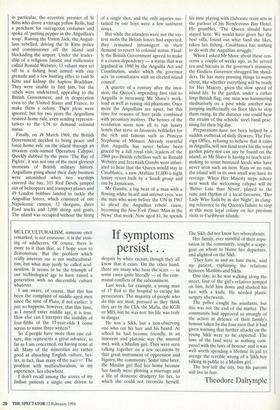If symptoms
persist.. .
MULTICULTURALISM, someone once remarked, is not couscous: it is the ston- ing of adulterers. Of course, there is more to it than that, as I hope soon to demonstrate. But the problem which really interests me is not multicultural- ism, but what may justly be called acul- turalism. It seems to be the triumph of our technological age to have raised a generation with no discernible culture whatever.
I am aware, of course, that this has been the complaint of middle-aged men since the time of Plato, if not earlier: it just so happens, however, that this time, as I myself enter middle age, it is true. How else can I interpret the inability of four-fifths of the 17-year-olds I come across to name three writers?
So if people have more than one cul- ture, this represents a great advance, as far as I am concerned, on having none at all. Many of the minorities are rather good at absorbing English culture, bet- ter, in fact, than many of the natives. The problem with multiculturalism, in my experience, lies elsewhere.
I don't recall among the scores of my Indian patients a single one driven to despair by white racism, though they all know that it exists. On the other hand, there are many who bear the scars — in some cases quite literally — of the com- munal conflicts of the subcontinent.
Last week, for example, a young man of 17 fled to the hospital to escape his persecutors. The majority of people who do this are mad, pursued as they think they are by the CIA, the Mafia, the KGB or MI5, but he was not: his life was truly in danger.
He was a Sikh, but a non-observing one who cut his hair and his beard. At school he had become friendly, in an innocent and platonic way (he assured me), with a Muslim girl. They were seen talking together on a few occasions by that great instrument of oppression and bigotry, the community. Some time later, the Muslim girl fled her home because her family were plotting a marriage and a life of domestic drudgery for her, to which she could not reconcile herself. The Sikh did not know her whereabouts.
Her family, ever mindful of their repu- tation in the community, sought a scape- goat on whom to blame her departure, and alighted on the Sikh.
'They hate us and we hate them,' said my patient, explaining the relations between Muslims and Sikhs.
One day, as he was walking along the street, four of the girl's relatives jumped on him, held him down and slashed his face with a knife. He needed plastic surgery afterwards.
The police caught his assailants, but this was not the end of the matter. The community had approved so strongly of the action in defence of their family's honour taken by the four men that it had given warning that further attacks on the young Sikh were to be expected. The laws of the land were as nothing com- pared with the laws of honour: and it was well worth spending a lifetime in jail to avenge the terrible wrong of a Sikh boy talking in public to a Muslim girl.
The boy left the city, but his parents still live in fear.
Theodore Dalrymple


















































 Previous page
Previous page